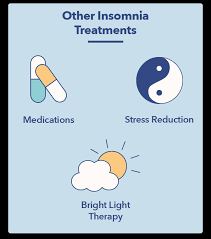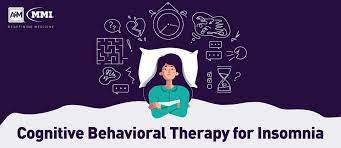Cognitive Behavioral Therapy for Insomnia
Insomnia is a common sleep disorder that affects millions of people worldwide. It can have a significant impact on one’s quality of life, leading to daytime fatigue, difficulty concentrating, and mood disturbances. While medication is commonly used to treat insomnia, cognitive behavioral therapy (CBT) has emerged as an effective non-pharmacological approach.
Understanding CBT for Insomnia
Cognitive behavioral therapy for insomnia focuses on identifying and modifying the thoughts and behaviors that contribute to sleep difficulties. It is based on the understanding that negative thoughts and behaviors surrounding sleep can perpetuate insomnia symptoms.
CBT for insomnia typically involves the following components:
- Sleep Education: Understanding the factors that influence sleep, such as sleep hygiene practices, circadian rhythm, and the role of anxiety or stress.
- Sleep Restriction: Limiting the time spent in bed to match the actual amount of sleep obtained, which helps increase sleep efficiency.
- Stimulus Control: Establishing a strong association between bed and sleep by using the bed only for sleeping and avoiding activities like watching TV or working in bed.
- Cognitive Restructuring: Identifying and challenging negative thoughts or beliefs about sleep that contribute to anxiety or worry about not sleeping well.
- Relaxation Techniques: Learning relaxation exercises such as deep breathing or progressive muscle relaxation to reduce physical tension and promote relaxation before bedtime.
The Benefits of CBT for Insomnia
Cognitive behavioral therapy for insomnia offers several advantages over medication-based treatments:
- Long-term effectiveness: CBT addresses the underlying causes of insomnia and equips individuals with skills to manage sleep difficulties in the long run, reducing the need for ongoing medication.
- No side effects: Unlike some sleep medications, CBT does not have any adverse side effects, making it a safe and sustainable treatment option.
- Improvement in overall well-being: By improving sleep quality and quantity, CBT can lead to better daytime functioning, improved mood, and increased productivity.
- Reduced reliance on sleep aids: Individuals who undergo CBT for insomnia often experience a decrease in their reliance on sleep aids or a complete cessation of medication use.
Seeking Professional Help
If you are struggling with insomnia, it is advisable to seek the guidance of a qualified healthcare professional or therapist trained in cognitive behavioral therapy. They can assess your specific situation and develop an individualized treatment plan tailored to your needs.
Cognitive behavioral therapy for insomnia has proven to be an effective intervention for those seeking relief from sleep difficulties. By addressing the underlying thoughts and behaviors that contribute to insomnia, individuals can regain control over their sleep patterns and improve their overall well-being.
9 Benefits of Cognitive Behavioral Therapy for Overcoming Insomnia: From Root Cause Resolution to Improved Sleep Quality
- Addresses the underlying causes of insomnia
- Teaches effective sleep hygiene practices
- Reduces reliance on medication for sleep
- Improves sleep quality and quantity
- Enhances daytime functioning and productivity
- Provides long-term solutions for managing sleep difficulties
- Safe and sustainable treatment option without side effects
- Helps individuals challenge negative thoughts about sleep
- Promotes relaxation techniques to reduce anxiety before bedtime
Six Challenges of Cognitive Behavioral Therapy for Insomnia: Evaluating Time, Access, Discomfort, Resistance, Relapse, and Cost
- Time commitment
- Limited accessibility
- Initial discomfort
- Potential resistance
- Relapse risk
- Cost considerations
Addresses the underlying causes of insomnia
One significant advantage of cognitive behavioral therapy (CBT) for insomnia is its ability to address the underlying causes of sleep difficulties. Unlike medication-based treatments that primarily focus on symptom management, CBT delves deeper into the root causes of insomnia. By identifying and modifying negative thoughts, beliefs, and behaviors surrounding sleep, CBT helps individuals break the cycle of insomnia and develop healthier sleep patterns. This approach not only provides long-term relief but also equips individuals with valuable skills to manage their sleep difficulties independently, leading to sustainable improvements in their overall sleep quality and well-being.
Teaches effective sleep hygiene practices
One of the key benefits of cognitive behavioral therapy for insomnia is that it teaches individuals effective sleep hygiene practices. Sleep hygiene refers to a set of habits and behaviors that promote good sleep quality and quantity. Through CBT, individuals learn about the importance of maintaining a consistent sleep schedule, creating a relaxing bedtime routine, and optimizing their sleep environment. By implementing these practices, individuals can establish healthy sleep habits that contribute to better overall sleep patterns and improved insomnia symptoms. CBT equips individuals with the knowledge and tools to prioritize their sleep hygiene, leading to long-term improvements in their ability to fall asleep, stay asleep, and wake up feeling refreshed.
Reduces reliance on medication for sleep
One of the significant advantages of cognitive behavioral therapy (CBT) for insomnia is that it reduces reliance on medication for sleep. Unlike sleep medications, which may have side effects and can lead to dependency, CBT addresses the root causes of insomnia and equips individuals with effective strategies to manage sleep difficulties without relying on medication. By learning techniques to modify negative thoughts and behaviors surrounding sleep, individuals can achieve long-term improvements in their sleep patterns, reducing the need for ongoing medication use and promoting a more sustainable and natural approach to achieving restful sleep.
Improves sleep quality and quantity
Cognitive behavioral therapy for insomnia offers the significant benefit of improving both sleep quality and quantity. By addressing the underlying thoughts and behaviors that contribute to sleep difficulties, CBT helps individuals develop healthier sleep habits and patterns. It equips them with strategies to manage anxiety, stress, and negative thoughts that often interfere with falling asleep or staying asleep. As a result, CBT promotes a more restful and uninterrupted sleep experience, allowing individuals to wake up feeling refreshed and rejuvenated. By improving both the quality and quantity of sleep, CBT contributes to overall well-being and enhances daytime functioning.
Enhances daytime functioning and productivity
One significant advantage of cognitive behavioral therapy (CBT) for insomnia is its ability to enhance daytime functioning and productivity. By improving sleep quality and quantity, CBT helps individuals feel more rested and energized during the day. This leads to increased alertness, improved concentration, and better cognitive performance. With enhanced daytime functioning, individuals are better equipped to handle daily tasks, meet work demands, and engage in social activities with greater efficiency and productivity. CBT’s positive impact on daytime functioning can significantly improve overall quality of life for those struggling with insomnia.
Provides long-term solutions for managing sleep difficulties
Cognitive behavioral therapy for insomnia offers a significant advantage by providing long-term solutions for managing sleep difficulties. Unlike medication-based treatments that may offer temporary relief, CBT addresses the underlying causes of insomnia and equips individuals with effective strategies to manage sleep problems in the long run. By identifying and modifying negative thoughts and behaviors surrounding sleep, CBT empowers individuals to develop healthier sleep habits and improve their overall well-being. This approach reduces the reliance on ongoing medication and promotes sustainable improvements in sleep quality, leading to lasting benefits for those struggling with insomnia.
Safe and sustainable treatment option without side effects
One significant advantage of cognitive behavioral therapy (CBT) for insomnia is that it is a safe and sustainable treatment option without any side effects. Unlike some sleep medications, which may come with unwanted adverse effects, CBT focuses on modifying thoughts and behaviors surrounding sleep to improve sleep quality. By addressing the underlying causes of insomnia, CBT equips individuals with skills and techniques to manage sleep difficulties in the long term, reducing the need for ongoing medication. This makes CBT an appealing choice for those seeking a natural and non-invasive approach to treating insomnia without the risk of side effects.
Helps individuals challenge negative thoughts about sleep
Cognitive behavioral therapy for insomnia offers individuals the valuable opportunity to challenge negative thoughts about sleep. Often, individuals with insomnia develop anxious or worrisome thoughts about their ability to fall asleep or stay asleep. These negative thoughts can create a cycle of increased anxiety and further disrupt sleep. However, CBT helps individuals recognize and challenge these negative thoughts, replacing them with more positive and realistic beliefs about sleep. By addressing these cognitive distortions, individuals can alleviate anxiety and create a more conducive mindset for restful sleep, ultimately improving their overall sleep quality and well-being.
Promotes relaxation techniques to reduce anxiety before bedtime
One of the significant advantages of cognitive behavioral therapy for insomnia is its focus on promoting relaxation techniques to reduce anxiety before bedtime. Many individuals with insomnia experience heightened levels of stress and worry, which can make it difficult to fall asleep. By incorporating relaxation techniques such as deep breathing exercises or progressive muscle relaxation, CBT helps individuals calm their minds and bodies, creating a conducive environment for sleep. By reducing anxiety and promoting relaxation, CBT empowers individuals to achieve a more peaceful and restful sleep, ultimately improving their overall sleep quality and well-being.
Time commitment
One potential drawback of cognitive behavioral therapy for insomnia is the time commitment it requires. Unlike quick fixes or medication-based treatments, CBT for insomnia often involves regular sessions over a period of several weeks or months. This can be challenging for individuals with busy schedules, as it may require finding time for therapy sessions amidst other commitments and responsibilities. However, it is important to note that the time invested in CBT can lead to long-term improvements in sleep quality and overall well-being, making it a worthwhile consideration for those seeking sustainable solutions to their sleep difficulties.
Limited accessibility
Limited accessibility is a significant drawback of cognitive behavioral therapy for insomnia. While CBT has proven to be an effective treatment, not everyone has easy access to qualified therapists who specialize in this therapy. This limitation is particularly prevalent in remote or underserved areas where there may be a shortage of healthcare professionals with the necessary expertise. As a result, individuals living in these areas may find it challenging to access this specific treatment option, potentially limiting their ability to receive the benefits of CBT for insomnia. Efforts should be made to improve the availability and accessibility of qualified therapists, ensuring that more individuals have access to this effective non-pharmacological treatment for insomnia.
Initial discomfort
During the cognitive restructuring process of cognitive behavioral therapy for insomnia, some individuals may experience initial discomfort or find it challenging to confront and challenge their negative thoughts and beliefs about sleep. This discomfort can arise from facing deeply ingrained patterns of thinking that have contributed to their sleep difficulties. However, it is important to note that this temporary discomfort is a normal part of the therapeutic process as individuals work towards changing their mindset and developing healthier sleep-related thoughts and beliefs. With the guidance and support of a trained therapist, individuals can gradually overcome this initial discomfort and reap the long-term benefits of improved sleep and overall well-being.
Potential resistance
Potential resistance is indeed a con of cognitive behavioral therapy for insomnia. Some individuals may be resistant to change or skeptical about the effectiveness of non-medication approaches. This skepticism can hinder their willingness to fully engage in the therapy and consequently limit the potential benefits they could derive from it. It is crucial for therapists to address such resistance and work collaboratively with clients to build trust, provide education, and demonstrate the efficacy of cognitive behavioral therapy for insomnia. By addressing these concerns, therapists can help individuals overcome their resistance and increase their chances of successfully benefiting from this therapeutic approach.
Relapse risk
One potential drawback of cognitive behavioral therapy for insomnia is the risk of relapse. Despite its effectiveness, individuals may experience a return of sleep difficulties if they fail to consistently practice the techniques learned during therapy or if they encounter significant life stressors that disrupt their sleep patterns. It is important for individuals to continue implementing the strategies and coping mechanisms acquired during therapy to maintain long-term success in managing insomnia. Regular practice and ongoing self-care can help mitigate the risk of relapse and sustain the benefits gained from cognitive behavioral therapy.
Cost considerations
Cost considerations can be a significant drawback of cognitive behavioral therapy for insomnia. While the therapy itself has proven to be effective, the cost of ongoing sessions with a qualified therapist trained in this approach may pose a financial burden for some individuals seeking treatment. Depending on insurance coverage and individual financial circumstances, the expenses associated with regular therapy sessions can add up over time. This can limit access to CBT for insomnia and make it less feasible for those who may benefit from it but cannot afford the costs. It is important to explore potential financial assistance options or discuss alternative solutions with healthcare providers to ensure that individuals in need are not excluded from this valuable treatment due to financial constraints.



